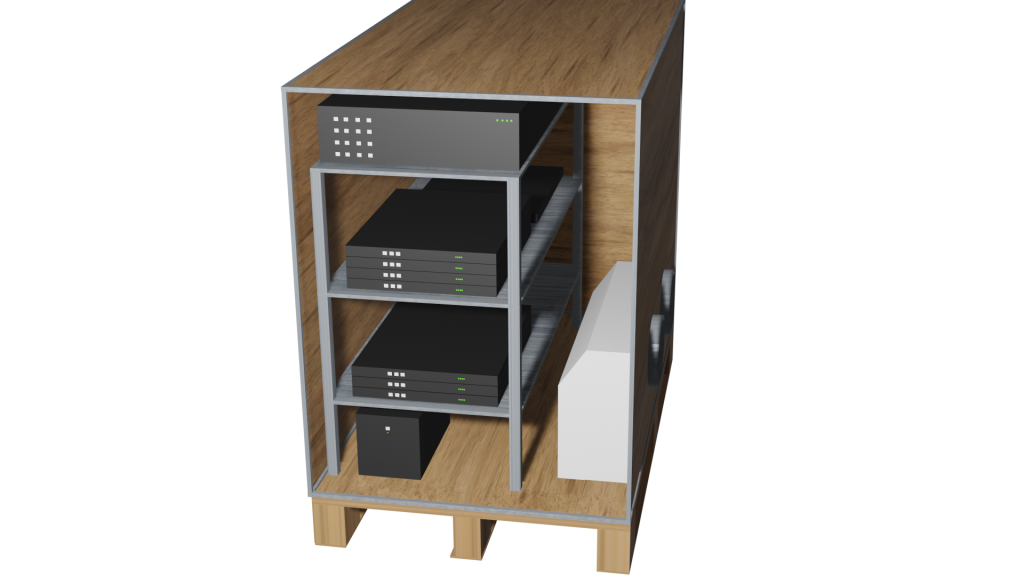When every second counts!

What is a Data Pallet ?
A data pallet, also known as a server pallet or a data center on a pallet, is a portable and self-contained unit designed to house and transport server equipment and IT infrastructure components. It combines the concept of a shipping pallet, typically used for transporting goods, with the functionality of a mini data center or server room.
A data pallet typically includes racks or shelves to accommodate servers, storage devices, networking equipment, power distribution units (PDUs), cooling mechanisms, and other necessary components. It is engineered to provide a secure and controlled environment for the equipment, ensuring its protection during transportation and deployment in different locations.
The primary purpose of a data pallet is to enable rapid deployment and relocation of server infrastructure. It is often used in scenarios where mobility is required, such as disaster recovery operations, temporary setups, remote sites, or events that demand on-site computing resources. By consolidating the necessary IT infrastructure into a single unit, it simplifies logistics, reduces setup time, and facilitates efficient management of server equipment.
Data pallets are designed with considerations for security, environmental control, power management, and connectivity. They may include features like locking mechanisms, access control systems, cooling systems, redundant power supplies, and network connectivity options. Some data pallets also incorporate remote management capabilities to enable monitoring and control of the equipment from a centralized location.
Overall, data pallets provide a flexible and convenient solution for organizations that require portable server infrastructure, allowing them to quickly set up or relocate computing resources as needed.


Benefits of DataPallet
-
Portability: DataPallet is designed to be easily transported using standard pallet handling equipment. This makes it highly convenient for deployment in various locations, including remote sites, temporary setups, disaster recovery scenarios, or any situation where mobility is required.
-
Compact Design: Despite its portability, DataPallet offers a compact form factor that efficiently utilizes space. It is engineered to accommodate servers, storage systems, power distribution units (PDUs), cooling mechanisms, and networking equipment, all within a confined area.
-
Robust Security: DataPallet is equipped with security features to safeguard sensitive data and IT infrastructure. It includes physical locks, access control systems, and monitoring capabilities to prevent unauthorized access and ensure the integrity of the equipment.
-
Environmental Control: Maintaining optimal temperature and humidity levels is crucial for the smooth operation of servers and networking devices. DataPallet integrates cooling mechanisms, such as fans or liquid cooling, to regulate the internal environment and prevent overheating.
-
Redundant Power and Connectivity: To ensure continuous operation, DataPallet incorporates redundant power supplies and networking connectivity options. This reduces the risk of downtime and enables high availability for critical applications.
-
Remote Management: DataPallet can be equipped with remote management capabilities, allowing administrators to monitor and control the equipment within the mini server room from a centralized location. This feature enhances efficiency and simplifies maintenance tasks.
-
Scalability: DataPallet is designed to be scalable, accommodating the growth of IT infrastructure requirements. It can be expanded by adding additional modules or units to support increased server capacity or other equipment needs.
-
Cost-Efficiency: Compared to traditional server rooms, DataPallet offers cost savings in terms of construction, maintenance, and operational expenses. Its compact design and portability eliminate the need for dedicated server rooms or data centers, making it an attractive solution for small to medium-sized businesses or organizations with budget constraints.
DataPallet revolutionizes the way server rooms are deployed and managed by combining mobility, security, and efficiency into a single solution. Its versatility makes it a valuable asset for industries such as logistics, event management, disaster recovery, edge computing, and many more.

Mobility and scalability
Mobility and Flexibility in Deployment
In today’s world, where speed and flexibility are paramount, DataPallet stands out as a revolutionary solution for deploying IT infrastructure. Designed for unparalleled mobility, DataPallet offers the ease of transport and installation that enables businesses to quickly respond to varied and changing needs. Whether for disaster recovery operations, temporary setups at events, or remote sites requiring onsite IT resources, DataPallet simplifies logistics and reduces setup time. Its compact and robust design not only ensures rapid deployment but also guarantees security and efficiency, regardless of the environment. This innovative system eliminates the need for permanent server rooms, offering flexibility that transforms IT resource management in scenarios demanding high mobility.
Scalability and Cost Efficiency
DataPallet redefines operational efficiency by offering a highly scalable and cost-effective solution for growing IT infrastructure needs. As businesses expand, so do the demands for server capacity and storage. DataPallet meets these challenges by enabling easy and economical expansion through its additional modules that can be seamlessly integrated to increase capacity. This modular approach not only supports growth without requiring massive investments in traditional infrastructure but also reduces maintenance and operational costs. By eliminating the need for dedicated server rooms and reducing overall expenses related to data center management, DataPallet presents itself as an ideal solution for small to medium-sized businesses or budget-conscious organizations. Its compact design maximizes space utilization while maintaining exceptional efficiency, making DataPallet an undeniable value-add for any organization looking to streamline expenses while boosting IT capacity.


Data Pallets in day to day operationnals
Rapid Deployment in Emergency Scenarios
Data pallets are designed for the rapid deployment of critical IT infrastructures, making them ideal for emergency situations or disaster recovery. They can be quickly transported and deployed to any site, offering an instant solution to restore computer operations after natural disasters or major disruptions. This mobility ensures that businesses can minimize business interruptions and restore their essential services as quickly as possible.
Support for Temporary Operations and Events
Data pallets are also perfectly suited to support temporary operations or events that require onsite computing capabilities. Whether for concerts, conferences, or temporary exhibitions, data pallets can provide the necessary infrastructure to manage ticketing, live streaming, and communication needs without requiring permanent installations.
Edge Computing
In the field of edge computing, where data processing is performed as close as possible to the source of the data, data pallets offer an effective solution to deploy computing resources directly in the field. They enable local data processing, thus reducing latency and improving the performance of applications, especially in sectors such as manufacturing, precision agriculture, and remote site monitoring.
Enhancing IT Capabilities of Small and Medium-Sized Enterprises
For small and medium-sized enterprises that do not have the resources to invest in significant IT infrastructures, data pallets represent a viable option. They provide a complete and secure infrastructure that can be used to extend existing IT capabilities or to launch new services without long-term commitment.
Flexibility and Scalability
As the needs of the business evolve, data pallets can be modified or expanded to accommodate new equipment or to increase capacity. This flexibility ensures that businesses can quickly adapt to market changes or expansions without the need for massive reinvestment in infrastructure.
In summary, data pallets revolutionize the way IT infrastructures are deployed, offering a flexible, secure, and mobile solution that meets the diverse needs of modern businesses in a variety of industrial and commercial contexts.